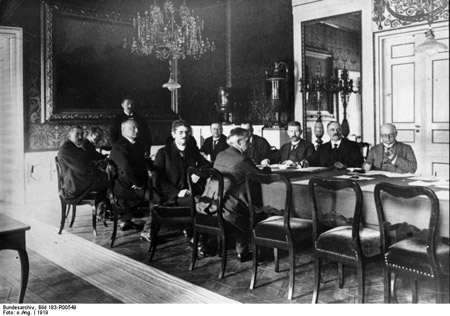![]()
This page is under construction.
Matthias Erzberger (20 September 1875 – 26 August 26 1921) was a moderate German politician and one of the leaders of the Catholic Centre Party. With the war drawing to its inevitable close, Prince Max von Baden, the German Chancellor, chose Erzberger to lead the delegation to negotiate an armistice with the allies. Erzberger had been an opponent of unrestricted submarine warfare during the war and had the reputation of being a moderate. During the negotiations with Marshal Ferdinand Foch, Erzberger was able to negotiate a few concessions. It was Paul von Hindenburg himself telegraphed back that the armistice should be signed, modifications or no. A while later, the new Chancellor, the socialist Friedrich Ebert, telegraphed authorizing Erzberger to sign. It was impossible for Germany to continue the war. So Erzberger signed the Armistice. He made a short speech on the occasion, protesting the harshness of the terms, and concluded by saying that "a nation of seventy millions can suffer, but it cannot die". (Foch ignored Erzberger's attempt to shake his hand and is said to have replied, "Très bien".)
As Minister of Finance in 1919, Erzberger supported the Treaty of Versailles (see the link to his book below) and worked to shore up German finances, which were not in good shape after the war and under the burden of reparations. He also worked on the German railway system.
Many Germans remained unhappy with the signing of the peace treaty. A legend was fostered that Germany had been betrayed by its civilian government and that if allowed the army could have continued and won the war. This became the famous "stabbed in the back" legend that Adolf Hitler would use to prominent effect on his rise to power. The "legend" was given further credence by Hindenburg, later the German president, even though it was Hindenburg himself who had urged that the Armistice had to be signed and that the army could fight no longer. (It was not surprising that many Germans believed in this theory of civilian betrayal. During the was the German government so closely controlled public information that most Germans had no idea that the armies were doing badly or that the war could be lost; then suddenly, out of the blue, as a complete shock, the war was over and Germany had lost.)
Anyway, Erzberger became one of the scapegoats for Germany's problems: the Armistice, the Treaty of Versailles, the onerous burdens of reparations owed to the Allies, his policies as Finance minister which included paying the reparations and also increases in land taxes to raise money. On 26 August 1921 while walking in a part of the Black Forest near Bad Griesbach, Erzberger was assassinated by two well-dressed, operatives of the Organisation Consul (a radical, right-wing death squad), which later also carried out the murder of Walter Rathenau, Minister of Foreign Affairs who had argued that Germany must fulfill its obligations under the Treaty of Versailles to be able to again take its place among the great nations of the world.
![]()
The League of Nations: The Way to the World's Peace by Matthias Erzberger (1919)
New York Times Headline and Article on his murder.
